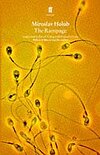Miroslav Holub (1923–1998)
Autore di Poems Before and After: Collected English Translations
Sull'Autore
Holub is a distinguished scientist as well as a poet. The noted British critic A. Alvarez sees Holub's main concern as "the way in which private responses, private anxieties, connect up with the public world of science, technology, and machines." (Bowker Author Biography)
Opere di Miroslav Holub
Andel na koleckach 2 copie
Syndrom mizející plíce 1 copia
Achilles a želva 1 copia
Zcela stručná úvaha o písmenu 1 copia
Tři kroky po zemi 1 copia
Tak zvané srdce 1 copia
Kam teče krev 1 copia
Žít v New Yorku 1 copia
Zcela nesoustavná zoologie 1 copia
Slabikář 1 copia
Žít v New Yorku 1 copia
Opere correlate
Machine van woorden : gedichten van Zbigniew Herbert, Miroslav Holub, Günter Kunert, Vasko Popa (1975) — Collaboratore — 4 copie
Etichette
Informazioni generali
- Data di nascita
- 1923-09-13
- Data di morte
- 1998-07-14
- Sesso
- male
- Nazionalità
- Czech
- Luogo di nascita
- Pilsner, Czechoslovakia
- Luogo di morte
- Prague, Czech Republic
- Luogo di residenza
- Plzen, Czechoslovakia (birth|now Czech Republic)
USA - Istruzione
- Charles University, Prague
- Attività lavorative
- poet
pathologist
immunologist
Utenti
Recensioni
Liste
Potrebbero anche piacerti
Autori correlati
Statistiche
- Opere
- 35
- Opere correlate
- 6
- Utenti
- 471
- Popolarità
- #52,267
- Voto
- 3.9
- Recensioni
- 2
- ISBN
- 44
- Lingue
- 5
- Preferito da
- 3













